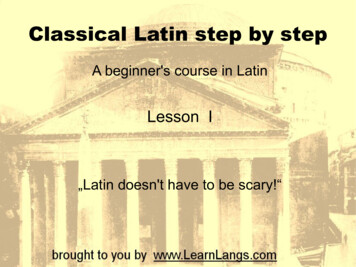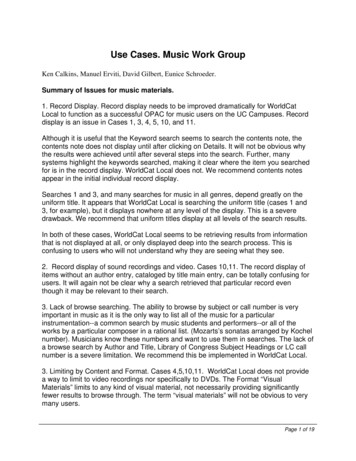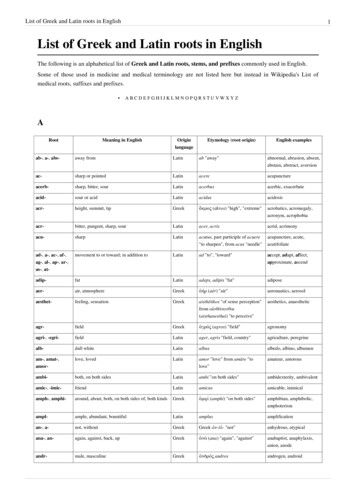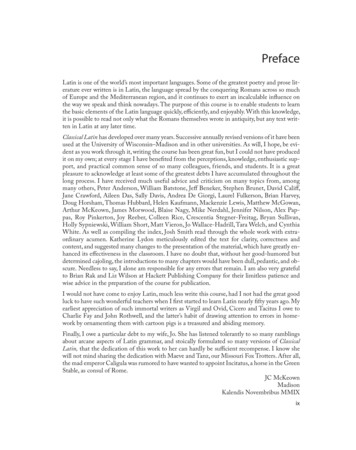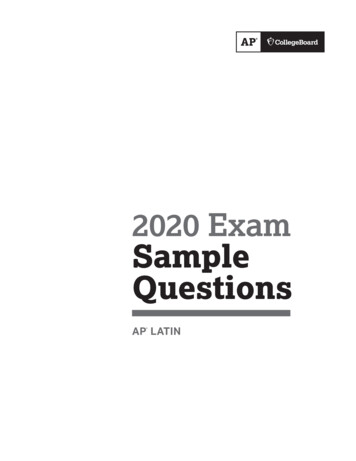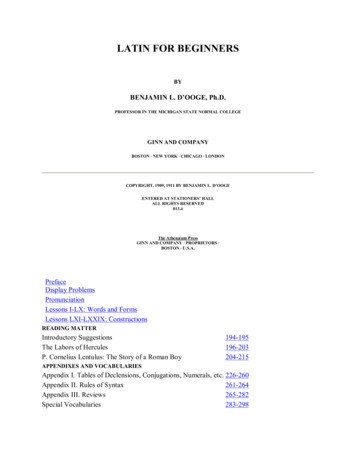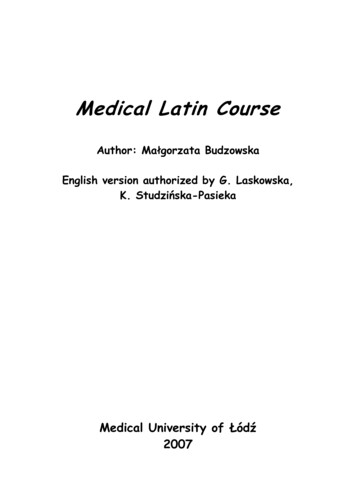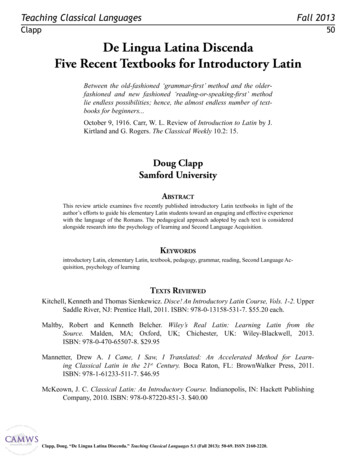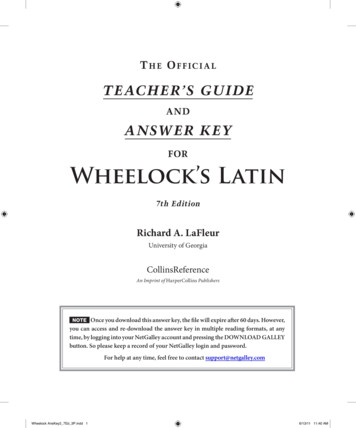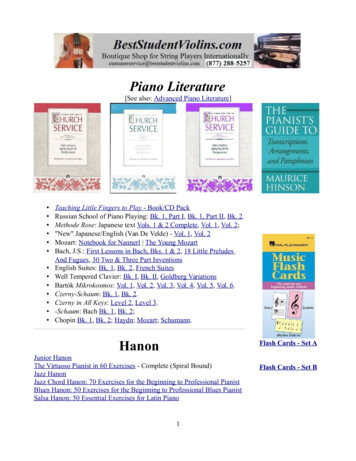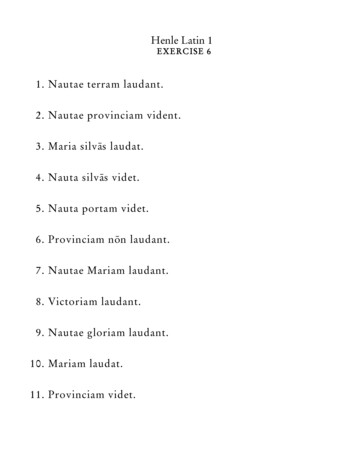
Transcription
Henle Latin 1EXERCISE 61. Nautae terram laudant.The sailors praise the land.2. Nautae provinciam vident.The sailors see the province.3. Maria silväs laudat.Mary praises the forests (woods).4. Nauta silväs videt.The sailor sees the forests (woods).5. Nauta portam videt.The sailor sees the gate.6. Provinciam nön laudant.They do not praise the province.7. Nautae Mariam laudant.The sailors praise Mary.8. Victoriam laudant.They praise victory.9. Nautae gloriam laudant.The sailors praise glory.10. Mariam laudat.He praises Mary.11. Provinciam videt.He sees the province.
EXERCISE 131. Christianī orant.Christians pray.2. Amicī Deī Christianös laudant.(The) friends of God praise Christians.3. Christianī Filium Deī laudant.Christians praise the Son of God.4. Christianī Mariam laudant.Christians praise Mary.5. Nautae servōs nön vident.The sailors do not see the slaves/servants.6. Servī Christianös laudant.The servants/slaves praise the Christians.7. Christianī servös Deī laudant.Christians praise the servants of God.8. Gloriam Deī vident.They see the glory of God.9. Christianī Christum laudant.Christians praise Christ.10. Maria et Christus amicös Deī laudant.Mary and Christ praise the friends of God.11. Deus terram et silväs videt. Nautās et servös etChristianös videt. G o d s e e s t h e e a r t h a n d t h eforests. He sees the sailors and the servants/slaves.12. Christianī Filium Mariae laudant.C h r i s t i a n s p r i s e t h eSon of Mary.
EXERCISE 171. Amicī Deī regnum Christī laudant.The friends of God praise the kingdom of Christ.2. Maria praemium et victoriam Christī videt.Mary sees the reward and victory of Christ.3. Nautae caelum et terram vident.The sailors see the sky and the earth.4. Deus pericula Christianörum videt.God sees the dangers of (the) Christians.5. Deus bella nön laudat.God does not praise wars.6. Servī Christī imperium Christī laudant.Servants of Christ praise the empire/power ofChrist.7. Maria gloriam regnī Christī videt.Mary sees the glory of Christ’s kingdom.8. Filius Deī praemia Marīae laudat.The Son of God praises the rewards of Mary.9. Nautae pericula bellī nön laudant.The sailors do not praise the dangers of war.
EXERCISE 191. C h r i s t u s D e ö g l o r i a m d e d i t .Christ gave glory to God.2. Servīs gladiōs nōn dederunt sed nautīs gladiös dederunt.They did not give swords to the slaves, but theygaveswords to the sailors.3. Nautae amicīs victoriam dederunt.The sailors gave the victory to (their) friends.4. Deus amicīs Mariae praemia dedit.God gave rewards to the friends of Mary.5. Deus Filiö regnum dedit.God gave the kingdom/royal power to the Son.6. Christianī gloriam Mariae et Filiö Mariae dederunt.Christians gave glory to Mary and to the Son ofMary.7. Deus Christö terram dedit.God gave the earth to Christ.8. Nautae gloriam bellī laudant sed pericula bellī nön laudant.The sailors praise the glory of war but they do notpraisethe dangers of war.9. Provinciam amicö dedit.He gave the province to the friend.10. Deus gloriam et victoriam Christianīs dedit.God gave glory and victory to the Christians.11. Amicö gladium dedit.He gave a sword to the friend.
EXERCISE 241 . “Estis filiī Deī.”“You are the sons of God.”2. Christus est Filius Mariae.Christ is the Son of Mary.3. Christianī sunt servī Deī.Christians are servants of God.4. Caelum est praemium Christianörum.Heaven is the reward of Christians.5 . Maria est in Caelö cum Deö.Mary is in Heaven with God.6 . Bellum in provinciā est.War is in the province.7 . Sumus filiī Deī.We are sons of God.8. Amīcus Deī es.You are a friend of God.9. Gallī sunt in Galliā, sed Romanī nön sunt in Galliā.The Gauls are in Gaul, but the Romans are not inGaul.10. Gallī sunt in oppidīs et in silvīs.The Gauls are in the towns and in the forests.11. Romanī gladiōs Gallīs nön dederunt.The Romans did not give swords to the Gauls.12. Silvae in Galliā sunt.Forests are in Gaul (There are forests in Gaul.)13. Röma nön est in Galliä.Rome is not in Ga ul.
14. Propter bellum Gallï nön sunt amïcï Römänörum.On acc ount of war the Ga uls are not frie nds of the Romans.15. Gladiï sunt in oppidö.Swords are in the town. // There are swords i n the tow n.16. Nautae estis.You a re sailors.17. Nautae in silvïs nön sunt.The sa ilors a re not i n the fore sts/woods.18. Cum amïcö in prövinciä sum.I a m wi th a friend i n the prov ince.19. Silvae sunt post oppidum.The w oods a re behi nd the town. // There are woods be hi ndthe tow n.20. Nautae sunt Christianī.The sailors are Christians.21. In oppidō sumus.We are in the town.2 2 . Romanus servō praemium dedit.The Roman gave a reward to the servant/slave.23. Sunt Deī amicī.They are friends of God.(Note positional emphasis on the Genitive “ of God”).24. Christianus es sed servus Romanī es.You are a Christian but you are a Roman’s servant.25. In Caelō nōn estis.
EXERCISE 261. In tabulā vidētis Rōmam et imperium Rōmānōrum.On the map you see Rome and the empire of theRomans.2. Rōmānī Rōmam incolunt.The Romans inhabit Rome3. Prōvinciās imperiī Rōmānōrum vidētis.You see the provinces of the empire of the Romans.4. Galliam vidētis.You see Gaul.5. Rōmānī Gallōs in bellīs vicērunt.The Romans conquered the Gauls in the wars.6. Gladiī nōn sunt in oppidīs Gallōrum quod Gallī post bellumgladiōs Rōmānīs dedērunt.Swords are not in the towns of the Gauls because afterthe war the Gauls gave the swords to the Romans.7. Itaque post victōriās Rōmānōrum prōvincia in Galliā est.Therefore after the victories of the Romans there is aprovince in Gaul.8. Prōvinciam Gallī et Rōmānī incolunt.The Gauls and the Romans inhabit the province.9. Pericula sunt in silvīs Galliae, quod Gallī nōn sunt amīcīRōmānōrum.There are dangers in the forests of Gaul, because theGauls are not friends of the Romans.10. Gallī sunt servī Rōmānōrum, quod Rōmānī Gallōs vicērunt.The Gauls are servants of the Romans, because theRomans conquered the Gauls.11. Itaque Gallī imperium Rōmānōrum nōn laudant, sed Rōmānīpropter glōriam bellī imperium laudant.Therefore the Gauls do not praise the empire of theRomans, but the Romans praise the empire on account ofthe glory of war.
EXERCISE 341. Chrïstus est Rëx Rëgum.Christ is (the ) Ki ng of King s.2. Hominës lücem vident.The me n se e the l ight.3. Nautae sunt hominës.Sailors are me n.4. Chrïstiänï vëritätem Christï laudant.Christians prai se the truth of Christ.5. Lüx in silväs nön est.Light i s not i n the forest. (T here is not light i n the forests).6. Römänï lëgem et vëritätem Chrïstï nön laudant.The Roma ns do not prai se the law a nd truth of Christ.7. Imperätorës Römänörum Gallös vïcërunt.The c ommande rs-in-chi ef (ge neral s) of the Roma ns conque redthe Gaul s.8. Gallörum ducës lëgem et imperium Römänörum nön laudant.The lea ders of the Ga ul s do not praise the la w a nd e mpi re(powe r, c omma nd) of the Roma ns.9. Chrïstus est Rëx hominum quod Deus est.Christ is the King of me n bec ause He is God.10. Dux Römänörum in Galliä est quod bellum est in Galliä.The lea der of the Roma ns is i n Ga ul because there i s war i nGa ul (li t. “wa r i s in Gaul” ).11. Römänï imperätörï et ducibus praemia dedërunt quod Gallös vïcërunt.The Roma ns gave re wards to the general and (to the) lea dersbeca use they conque red the Gauls.12. Römänï ducës et rëgës Gallörum vïcërunt.The Roma ns conque red the le aders a nd ki ngs of the Gaul s.
EXERCISE 361. Gallï Caesarï, imperatorï Römänörum, praemia nön dedërunt.The Gauls did not give rewards to Caesar, thecommander-in-chief of the Romans.2. Servus vöcem Caesaris imperätöris audïvit.The servant heard the voice of Caesar the commanderin-chief.3. Deus, Rëx Caelï et terrae, salütem hominibus dedit.God, the King of Heaven and earth, gave salvation tomen.4. Caesar, dux Römänörum, vöcës Gallörum in silvïs audïvit.Caesar, leader of the Romans, heard the voices of theGauls in the forests.5. Propter salütem hominum Chrïstus est homö.On account of the salvation of men Christ is a man.6. Chrïstus, Fïlius Deï, est Fïlius Marïae.Christ, the Son of God, is the son of Mary.7. Gallï, servï Römänörum, Römänös nön laudant.The Gauls, slaves of the Romans, do not praise the Romans.8. Chrïstiänï Chrïstum, Filium Marïae, laudant.Christians praise Christ, the son of Mary.
EXERCISE 411. Sunt perïcula in silvïs Galliae.There are dangers in the forests of Gaul.2. Nön est päx in Galliä quod Caesar cum mïlitibus inGalliä est.There isn’t peace in Gaul because Caesar is in Gaulwith the soldiers.3. Sunt viae in prövinciä.There are roads in the province.4. Populus ducem mïlitum propter virtütem laudat.The people/nation praises the leader of the soldiersonaccount of virtue/courage.5. Römänï viäs in prövinciä münivërunt.The Romans constructed roads in the province.6. Est päx in Caelö.There is peace in Heaven.7. Sunt Chrïstiänï in Caelö.There are Christians in Heaven.8. In pace et in bellö Chrïstiänï oränt.In peace and in war Christians pray.9. Sunt mïlitës in viä.There are soldiers on the road.10. Caesar mïlitibus praemia virtütis dedit quod Gallösvicërunt.Caesar gave rewards of courage to the soldiersbecause they conquered the Gauls.11. Ducës Gallörum oppida münïvërunt.The leaders of the Gauls constructed/fortified thetowns.
EXERCISE 461. Ducës Römänörum hostës in colle vïcërunt.The leaders of the Romans conquered the enemy onthe hill.2. Propter caedem mïlitum bellum in Galliä est.On account of the slaughter of the soldiers war is inGaul.3. Sunt perïcula in Galliä quod Gallï hostësRömänörum sunt.There are dangers in Gaul because the Gauls areenemies of the Romans.4. Christus est rëx populörum et salüs hominum quodDeus est.Christ is the King of the people/nations and thesalvation of men because He is God.5. Pars hostium in sïlvïs est, sed pars est in colle.(A) part of the enemy is in the forests, but a part ison t he hill.6. In Galliä sunt collës et silvae et oppida et viae.In Gaul there are hills and forests and towns androads.7. Römänï rëgës et gentës Galliae vïcërunt.The Romans conquered the kings and tribes of Gaul.8. Propter salütem populï et päcem prövinciärumRömänï viäs münïvërunt.On account of the welfare/safety of the people andthe peace of the provinces the Romans constructedroads.9. Hominës virtütem et vëritätem laudant.Men praise virtue/courage and truth.10. Post caedem hostium Caesar mïlïtës propter virtütemlaudat.After the slaughter of the enemy Caesar praises thesoldiers on account of courage.
EXERCISE 52Chri stus est rëx homi num sed est fräte r hominum, et Deus est rëxhominum sed est pater hominum. Itaque hominë s sunt fratrës. Ita quebellum est caedës frätrum. Itaque Deus et Christus bellum nön laudant.Chri st is the King of men but He is the brother of men, and God is theKing of men but He is the father of men. Therefore men are brothers.Therefore war is the slaughter of brothers. Therefore God and Christdo not praise war.2. Caedës GallörumRömänï partem prïncipum Gallörum occïdërunt. Itaque Deus clamöremmätrum et patrum et frätrum i n sil vïs et montibus Galliae audïvit.The Romans killed (a) pa rt of the chief men of the Gauls. ThereforeGod heard the shout(ing ) of the mothers and fathe rs and brothers i n theforests and mountains of Gaul .3. In GalliäIn Galliä sunt silvae et montës et collës. Sunt oppi da in collibus, sedpars gentium Gallörum montë s et silväs i ncolunt.In Gaul the re are fore sts and mountains and hills. There are tow ns inthe hills, but pa rt of the tribes of the Gauls inhabi t the mountains andthe forests.4. Chrï stus, Dux HominumChrï stus est dux hominum quod v ëritatem et lëgem et l ücem homini busdedit. Chrïstus est “Via” et “Veri tas.”Chri st i s the leader of men because he gave truth a nd law and lig ht tomen. Christ i s the “Way” and the “Truth.”
EXERCISE 561. Propter vulnera milës in agmine nön est.On account of wounds the soldier is not in thecolumn.2. Imperätor vulnera mïlitum videt.The general sees the wounds of the soldiers.3. Sunt corpora in flümine.There are bodies in the river.4. In Galliä sunt flümina et silvae.In Gaul there are rivers and forests.5. Römänï in itinere sunt.The Romans are on the journey/march.6. Sunt höstës in silvïs et in montibus. Itaque inperïculö sumus.The enemy are in the forests and in the mountains.Therefore we are in danger.7. Caesar agmen hostium videt.Caesar sees the column of the enemy.8. Chrïstiänï nömen Marïae laudant.Christians praise the name of Mary.9. Agmen hostium in flümine est.The column of the enemy is in the river.10. Römänï Chrïstiänös occidërunt quod Chrïstiänïnömen Chrïstï laudant.The Romans killed the Christians because theChristians praise the name of Christ.
EXERCISE 591. “Estis lüx mundï.”“You are the light of the world.”2. Propter salütem hominum Chrïstus erat in mundö.On account of the salvation of men Christ was in theworld.3. Chrïstus lücem et lëgem et salütem et vëritätemhominibus dedit.Christ gave light and law and salvation and truth tomen.4. Caesar, imperator Römänörum, cum mïlitibus inGalliä erat.Caesar, general of the Romans, was in Gaul with thesoldiers.5. Chrïstus est salüs mundï.Christ is the salvation of the world.6. Servï nömen rëgis laudant.Servants praise the name of the king.7. Agmen hostium in montibus erat.The column of the enemy was in the mountains.8. Propter caedem prïncipum nön erat pax.On account of the slaughter of the leading men(chiefs) there was not peace.9. Propter vulnera mïlïtës in itinere nön erant.On account of the wounds the soldiers were not onthe journey/march.10. Deus, pater hominum, virtütem laudat sed bella etcaedem nön laudat.
God, the Father of men, praises virtue, but he doesnot praise wars and slaughter.11. Dux vöcës servörum et clämorem mïlitum audïvit.The leader heard the voices of the servants and theshout of the soldiers.12. Post bellum corpora erant in collibus et inflüminibus, et imperator clämörem mätrum audïvit.After the war there were bodies on the hills and inthe rivers, and the general heard the cry of themothers.13. Chrïstianï fratrës Chrïstï et mïlitës Chrïstï sunt.Christians are brothers of Christ and they aresoldiers of Christ.14. Römänï partem prïncipum Gallörum occïdërunt.The Romans killed (a) part of the leading men(chiefs) of the Gauls.15. Gentës et populï Galliae imperium Römänörum nönlaudant.The tribes and people of Gaul do not praise theempire of the Romans.
EXERCISE 651. Nunc sunt portüs in Galliä.Now there are harbors in Gaul.2. Post adventum Römänörum bellum erat in Galliä.After the arrival of the Romans there was war in Gaul.3. Caesar cum equitätü in prövinciam vënit.Caesar came into the province with the cavalry.4. Caesar autem cum exercitü nön erat.However Caesar was not with the army.5. Propter metum Römänörum Gallï in silväs vënërunt.On account of the fear of the Romans the Gauls cameinto the forests.6. Nautae portum vident.The sailors see the harbor.7. Senätus Caesarem laudat quod Römänï hostës vicërunt.TheSenate praises Caesar because the Romans conqueredthe enemy.8. Impetum in hostës fëcërunt.They made an attack upon the enemy.9 . Post adventum equitätüs mïlitës impetum in Gallösfëcërunt.After the arrival of the cavalry the soldiersmade an attack against the Gauls.1 0 . Gallï in colle erant. In Gallös autem Caesaris mïlitës impetumfëcërunt. Ducës et prïncipës Gallörum occidërunt et Gallösvicërunt. Post bellum, propter metum Caesaris, hostës impetumin Römänös nön fëcërunt.The Gauls were on the hill. However thesoldiers of Caesar made an attack against theGauls. They killed the leaders and chiefs of theGauls and they conquered the Gauls. After thewar, on account of the fear of Caesar, the enemydid not make an attack upon the Romans.1 1 . Gallï senätum occïdërunt.The Gauls killed the Senate.
EXERCISE 67Caedës Chrïstiänörum1. Post Chrïstï adventum lüx vëritätis in mundö erat, sedRömäni amïcï Chrïstï et vëritätis nön erant.After the coming of Christ light and truth were in theworld, but the Romans were not friends of Christ andtruth.2. Chrïstiänï autem amïcï Chrïstï erant.However, Christians were friends of Christ.3. Erant multï Chrïstiänï in imperiö Römänörum.There were many Christians in the empire of theRomans.4. Erant in portibus et in oppidïs prövinciärum et insilvïs et in montibus.They were in the harbors and in the towns of theprovinces and in the forests and in the mountains.5. Erant in exercitü et in equitätü et in senätü.They were in the army and in the cavalry and in theSenate.6. Erant servï et mïlitës; erant mätrës et patrës, Gallï etRömänï.ThereThey were servants and soldiers;they /there/were mothers and fathers, Gauls and Romans.7. Propter metum autem Chrïstï Rëgis et propter nömenDeï Chrïstiänörum Römänï Chrïstiänös occïdërunt.However, on account of the fear of Christ the Kingand on account of the name of the God of Christians,the Romans killed the Christians.11
8. Post caedem Chrïstiänörum, Römänï nön erant amïcïet servï Deï.After the slaughter of the Christians, the Romanswere not friends and servants of God.9. Chrïstiänï autem, quod Römänï Chrïstiänös propterlëgem Chrïstï occïdërunt, nunc in Caelö sunt cumMariä et Chrïstö et glöriam Deï Patris vident.However Christians, because the Romans killed theChristians on account of the law of Christ, are nowin Heaven with Mary and Christ and they see theglory of God the Father.
EXERCISE 721. Mïlitës in acië erant.The soldiers were on the battle line.2. Römänï Chrïstiänös propter fidem occïdërunt.The Romans killed the Christians on account of faith.3. Mïlitës spem victöriae in virtüte posuërunt.The soldiers placed hope of victory in courage.4. Römänï in aciem hostium impetum fëcërunt.The Romans made an attack against the battle line ofenemy.5. Gallï aciem Römänörum in colle vident.The Gauls see the battle line of the Romans on thehill.6. In Chrïstö est spës mundï.In Christ is the hope of the world.7. Deus Chrïstiänös propter fidem et virtütem laudat.God praises Christians on account of faith and virtue.8. Mïlitës rem vident.The soldiers see the affair/thing.
EXERCISE 76“Castra Römänörum”1. Vidëtis exercitum Römänörum in castrïs.You see the army of the Romans in the camp.2. Vidëtis mïlitës et ducës et imperätörem.You see the soldiers and the leaders and the general.3. Vidëtis gladiös mïlitum.You see the swords of the soldiers.4. Impedïmenta nön vidëtis, sed impedïmenta sunt incastrïs.You do not see the baggage train, but the baggagetrain is (lit. “are”) in the camp.5. In castra est cöpia omnium 1 rërum.In the camp there is a supply of all things.6. Mïlitës castra in colle posuërunt sed nön in silvïs.The soldiers pitched camp on the hill but not in theforests.7. In castra agmen cum impedïmentïs vënit.The column came into the camp with the baggagetrain.8. Hostës autem impetum in castra fëcërunt, sed cöpiaeRömänörum hostës vïcërunt.However, the enemy made an attack upon the camp,but the forces of the Romans conquered the enemy.9. Nunc imperator mïlitës et ducës propter virtütemlaudat, et ducës propter victöriam grätiäs mïlitibusagunt.Now the general praises the soldiers and leaders onaccount of courage, and the leaders give thanks to thesoldiers on account of victory.10. Propter victöriam imperator in grätiam cum senätüvënit.On account of victory the general came into
favor/influence with the Senate.EXERCISE 771. Gallï erant hostës Römänörum.The Gauls were the enemy (enemies) of the Romans.2. Itaque Römänï cum cöpiïs in Galliam vënërunt etcastra posuërunt.Therefore the Romans came with troops into Gauland they pitched camp.3. In castrïs erant mïlitës et equitätus et servï et mïlitumimpedimenta.In the camp there were soldiers and the cavalry andservants and the baggage (train) of the soldiers.4. Cöpia gladiörum in castrïs erat.A supply of swords was in the camp.5. Erant aciës in collibus et montibus et silvïs.There were battle lines in the hills and mountains andforests.6. Gallï in Römänös impetum fëcërunt; Römänï autem inGallös impetum fëcërunt.The Gauls made an attack against/upon the Romans;However the Romans made an attack against theGauls.7. Römänï spem victöriae in virtüte posuërunt; Gallïspem salütis in virtüte posuërunt.The Romans placed hope of victory in courage; theGauls placed hope of safety/salvation invirtue/courage.
8. Römänï autem Gallös vïcërunt; partem prïncipum etducum Gallörum occïdërunt; portüs et oppidaGallörum cëpërunt (captured).However the Romans conquered the Gauls; theykilled part of the chief men and leaders of the Gauls;they captured ports and towns of the Gauls.9. Itaque Gallï cöpiam gladiörum et servörum Römänïsdedërunt.Therefore the Gauls gave a supply of swords andslaves to the Romans.10. Post bellum erat päx in Galliä, sed erant castraRömänörum in Galliä et Gallï servï Römänörumerant.After the war there was peace in Gaul, but there werecamps of the Romans in Gaul and the Gauls wereslaves of the Romans.11. Imperätor Römänörum erat Caesar.The commander-in-chief of the Romans was Caesar.12. Senätus propter victöriäm et militum virtütemCaesarem et exercitum laudat, et Römänï Caesarïgrätiäs agunt.The Senate praises Caesar and the army on account ofvictory and the courage of the soldiers, and theRomans give thanks to Caesar.
EXERCISE 801. Chrïstus, Fïlius Deï, est filius Marïae.Christ, the Son of God, is the son of Mary.2. Itaque homö et Deus est.Therefore He is a man and God.3. Chrïstus Rëx hominum est quod Deus est.Christ is King of men because He is God.4. In Christö est salüs hominum, quod, propter salütemhominum, in mundum vënit.In Christ is the salvation of men, because, on accountof the salvation of men, He came into the world.5. Est “Lüx Mundï” quod hominibus vëritatem dedit.He is “the Light of the World” because He gave truthto men.6. Itaque Chrïstiänï grätiäs Deö et Christö agunt, etChristum, Rëgem et Imperätorem, laudant.Therefore Christians give thanks to God and toChrist, and they praise Christ, the King andCommander-in-chief.
EXERCISE 831. Deus, pater hominum, in Caelö est.God, the Father of men, is in Heaven.2. Deus lëgem homin ibus dedit.God gave the law to men.3. Propter salütem hominum Chrïstus homö in terräerat.On account of the salvation of men Christ was aman on the earth.4. Chrïstus est l üx mundï.Christ is the light of the world.5. Chrïstus, Filiüs Deï, est rë x gentium et populörum.Christ, the Son of God, is king of the tribes andpeoples/nations.6. Post adventum Chrïstï, vëritäs erat in mundö.After the coming of Christ, truth was in the world.7. Spïritus Deï in Chrïstö erat.The Spirit of God was in Christ.8. Rëgnum Chrïstï est rëgnum Caelï.The kingdom of Christ is the kingdom of Heaven.9. Chrïstiänï in nömine Chrïstï örant.Christians pray in the name of Christ.12. Caelum est praemium virtütis.Heaven is the reward of virtue.13. Deus fidem Chrïstiänörum laudat.God praises the faith of Christians.14. Frätrës estis.You are brothers.15. Amïcus est amicï servus.A friend is a servant of a friend.
16. Mïlitës päcem laudant.Soldiers praise peace.17. Röma nön est in Galliä, sed prövincia Römänörumest in Galliä.Rome is not in Gaul, but the province of the Romansis in Gaul.18. Gallï Galliäm incolunt.The Gauls inhabit Gaul.19. Nautae portüs vident.The sailors see the harbors.20. Römänï viäs in provinciïs münïvërunt.The Romans constructed roads in the provinces.21. Chrïstiänï caedem prïncipum hostium nön laudant.Christians do not praise the slaughter of the chiefs ofthe enemy.22. Caesar imperium Galliae Gallïs nön dedit.Caesar did not give the empire of Gaul to the Gauls.23. Imperätor clämörem et vöcës hostium audïvit.The general heard the shouting and cries of theenemy.24. Propter vulnera mïlitës iter nön fëcërunt.On account of wounds the soldiers did not make thejourney/march.25. Propter metum dux rëgem laudat.On account of fear the leader praises the king.26. Propter bellum erant mïlitës et cöpia gladiörum inoppidö.On account of war there were soldiers and an/aabundance/supply of swords in the town.27. Hostës in montibus et collibus erant.The enemy were in the mountains and hills.28. Corpora militum in silvïs erant.
29.30.31.32.33.34.35.36.The bodies of the soldiers were in the woods.Partem equitätüs in flümine occïdërunt.They killed part of the cavalry in the river.Senätus et prïncipës exercituï propter victöriamgrätiäs agunt.The Senate and the chief men give thanks to the armyon account of the victory.Römänï spem in virtüte posuërunt.The Romans placed hope in courage.Caesar cum cöpiïs et impedïmentïs in castra vënit.Caesar came into the camp with the troops andbaggage train.Propter grätiam Caesaris prïncipës Gallörum servösRömänïs dedërunt.On account of the influence of Caesar the chiefs ofthe Gauls gave slaves/servants to the Romans.Hostës erant post aciem Römänörum. Equitätusautem in aciem vënit. Itaque Römänï hostës vïcëruntet occïdërunt.The enemy were behind the battle line of theRomans.However the army came into the battle line.Therefore the Romans conquered and killed theenemy.In silväs Galliae Caesar venit. Prïncipës autemGallörum rem vidërunt. 2 Itaque impetum in agmenCaesaris fëcërunt.Caesar came into the forests of Gaul. However thechiefs of the Gauls saw the affair. Therefore theymade an attack upon the column of Caesar.Mïlitës in acië örant quod in perïculö sunt.Soldiers pray in the battle line because they are indanger.
EXERCISE 861. Multï Chrïstiänï in primä acië erant.Many Christians were in/on the first battle line.2. Säncta Marïa örat.Holy Mary prays.3. Longum agmen in altös montës vënit.The long column (of soldiers) came into the highmountains.4. Nauta malus nön örat.The bad sailor does not pray.5. Dux bonus magnam virtütem mïlitum laudat.The good leader praises the great courage of thesoldiers.6. In longö agmine multï mïlitës et impedïmenta sunt.Many soldiers and a baggage train are in the longcolumn.
EXERCISE 891. Lëgiönës Römänae prö castrïs erant.The Roman legions were in front of/before thecamp(s).2. Säncta Marïa prö hominibus malïs et bonïs örat.Holy Mary prays on behalf of bad and good men.3. Multï Gallï prö portïs caströrum erant.Many Gauls were in front of the gates of thecamp(s.)4. Prïncipës prö mürö altö erant.The chiefs were in front of the high wall.5. Mïlitës Römänï prö mürö oppidï magnï castraposuërunt.The Roman soldiers pitched camp in front of thewall of the large town.6. Chrïstiänï prö amïcïs örant.Christians pray on behalf of friends.7. Prö rëge bonö mïlitës impetum in hostës fëcërunt.On behalf of the good king the soldiers made anattack on the enemy.8. Erat magna inopia frümentï in Galliä.There was a great lack of grain in Gaul.9. Reliquï mïlitës Chrïstiänï in prïmä acië prö silvïserant.The remaining Christian soldiers were on the firstbattle line in front of the forests.10. Servï dominum bonum laudant.Servants praise a good master.
EXERCISE 90Erat magna inopia frümentï in castrïs Römänïs quodGallï Römänïs cöpiam frümentï nön dedërunt etfrümenta in Galliä nön erant. .There was a great lack of grain in the Roman campbecause the Gauls did not give a supply of grain to theRomans and there were not (any) crops in GaulGallï nön erant amïcï Römänörum. Itaque Caesar cumcöpiïs et impedïmentïs in Galliam vënit.The Gauls were not friends of the Romans. ThereforeCaesar came into Gaul with a troops and a baggage train.Agmen Caesaris longum erat. Via in angustïs et altïsmontibus erat.The column of Caesar was long. The journey was in thenarrow and high mountains.Itaque Gallï impetum in longum agmen fëcërunt, sedGallös legiönës Römänae vïcërunt.Therefore the Gauls made an attack upon the longcolumn, but the Roman legions conquered the Gauls.Itaque in oppidum tütum vënërunt reliquï Gallï. Römänïautem castra prö mürö altö posuërunt.Therefore the remaining Gauls came into the safe town.However the Romans pitched camp in front of the highwall.
Prïma aciës Caesaris prö castrïs erat. Gallï autempropter magnum metum Caesaris impetum in castraRömäna nön fëcërunt.The first battle line of Caesar was in front of the camp.However the Gauls, on account of the great fear ofCaesar, did not make an attack against the Roman camp.Itaque Römänï impetum in Gallös fëcërunt et Gallösvïcërunt. Multös Gallös et magnam partem principumGalliae occïdërunt.Therefore the Romans made an attack upon the Gaulsand they conquered the Gauls. They killed many Gaulsand a great part of the leading men of Gaul.Post victöriam Caesaris erat päx in Galliä. Itaque Gallïmagnam frümentï cöpiam Römänïs dedërunt, et nön eratinopia frümentï in castrïs Römänïs.After the victory of Caesar there was peace in Gaul.Therefor the Gauls gave a great supply of grain to theRomans, and there was not a lack of grain the the Romancamp.*************
EXERCISE 921. Agmen longum erat.The column was long .2. Reliquï Gallï tütï nön erant.The remaining Gaul s we re not safe .3. Mïlitës Chrïstïanï prö i mperätöre bonö impetum i n hostë s fëcërunt.The Christian sol diers made an attack upon the ene my on behalf ofthe good general.4. Via angusta e rat.The road was narrow.5. Longum ag men in montës altos vë nit.The long col umn came into the hi gh mountains.6. Prima legiö i n acië erat.The first legion wa s in/on the battle line.7. Magna frümentï i nopia i n reliquïs gentibus erat.There was a g reat scarcity of g rain in the re maining tribe s.8. Homi nës malï prö reliquïs homini bus nön örant.The bad men do not pray for the remaining men.9. Sunt multa flümi na in Galliä.There are many rivers in Gaul.10. Dominus, homö bonus et sanctus, se rvïs frümentum dedit.The ma ster, a g ood and holy man, gave grain to the servants/slaves.11. Legiönës Römänae in acië prö mürö alto era nt.The Roman legions were in the battle line in front of (before) thehigh wall .
EXERCISE 981. Gallï glöriae cupidï erant.The Gauls were desirous of glory.2. Fïlius similis patris est.A/The son is similar to a/the father.3. Gallï fïnitimï erant prövinciae.The Gauls were next to the province.4. Marïa est grätiä plëna.Mary is full of grace.5. Gallia plëna Römänörum erat.Gaul was full of Romans.6. Oppidum plë
Henle Latin 1 EXERCISE 6 1. Nautae terram laudant. The sailors praise the land. 2. Nautae provinciam vident. The sailors see the province. 3. Maria silväs laudat. Mary praises the forests (woods). 4. Nauta silväs videt. The sailor sees the forests (woods). 5. Nauta portam videt. The sailor sees the gate. 6. Provinciam nön laudant.File Size: 500KBPage Count: 98
